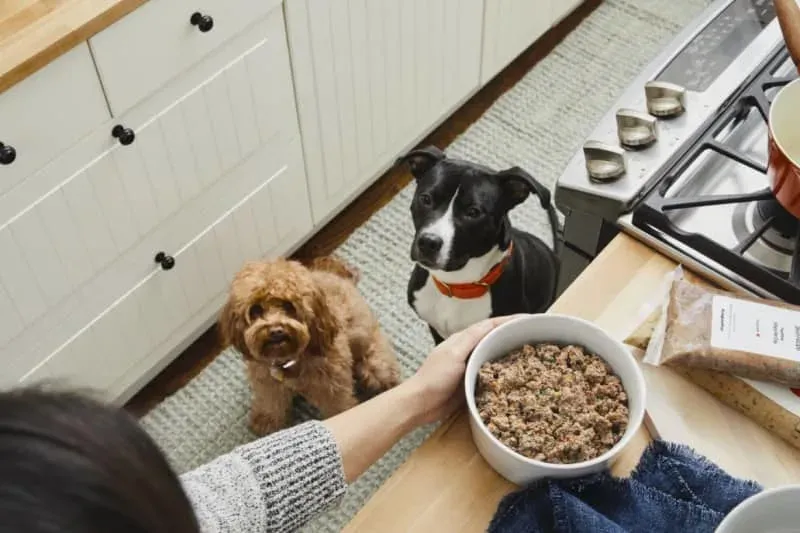Dealing with a picky eater can turn mealtime into a frustrating battle for any dog parent. Beyond the immediate worry that your beloved pup isn’t getting a nutritionally balanced diet essential for their well-being, there’s the underlying fear of unhealthy weight fluctuations, which can eventually lead to significant health complications. When faced with a fussy eater, the most crucial step is to identify and address the root cause as quickly as possible.
“If a dog has a picky appetite, I always tell patients to make sure that their dog doesn’t have an underlying disease,” advises Dr. Carly Fox, a senior veterinarian at NYC’s Schwarzman Animal Medical Center. She emphasizes the importance of immediate veterinary assessment, including routine bloodwork and a thorough exam, to rule out any systemic issues or underlying illnesses that might be impacting their appetite. Once health concerns are excluded, it’s time to implement healthy eating habits to encourage better consumption.
Why Does My Dog Refuse to Eat?
Persistent fussy eating habits can often stem from behavioral patterns rather than medical problems. Dr. Fox notes, “Maybe your dog likes variety or needs to switch their diet from wet food to dry food or vice versa.” If you decide to transition your dog to a new diet, a gradual approach over three to five days is recommended. This allows your canine companion ample time to adjust to new flavors and textures. Another effective strategy can be to enhance the palatability of dry kibble by adding moist toppers. However, for dogs with sensitive stomachs, like her own, Dr. Fox suggests opting for a prescription diet from reputable commercial brands such as Hill’s Science to help regulate their gastrointestinal tract.
How to Feed a Picky Dog Effectively
A common pitfall for many pet parents with picky eaters is the fear of underfeeding, leading them to inadvertently overfeed their pets. This often results in offering too many treats or constantly refilling the bowl. It is vital to exercise extreme caution in such situations. Dr. Fox warns, “Obesity is a huge problem in our pet population and can shorten a dog’s lifespan up to two years.” Moreover, obesity significantly increases the risk of developing other serious health conditions, including cancer, arthritis, diabetes, and urinary stones. Considering fiber for dogs can also aid in maintaining a healthy digestive system and weight.
To ensure your dog stays trim and fit, Dr. Fox strongly recommends adhering to a strict feeding schedule and conducting regular weight check-ups. Pet owners should always consult the feeding chart on their dog’s food package for the recommended amount based on age and weight. “Your dogs can’t go to the cupboard to feed themselves, so it’s really up to the pet owners to feed them in a healthy way,” she stresses. Responsible feeding is key to their long-term health.
Choosing the Right Treats for Fussy Eaters
When selecting treats for a picky dog, prioritizing low-calorie options is essential. For fresh, wholesome treats from your kitchen, consider vegetables like carrots, snap peas, cauliflower, and broccoli. These provide a healthy, low-calorie alternative to many commercial treats. If you’re purchasing treats from a pet store, opt for low-calorie or dehydrated varieties that contain minimal ingredients. Dr. Fox also cautions against giving too many treats, as this can exacerbate fussy eating habits. “So you should be very careful about what you’re picking,” she advises. Additionally, be aware of what is the one meat that dogs should never eat to prevent any accidental harm.
CBD Products for Dogs: What Vets Advise
The recent surge in popularity of CBD products, infused into everything from pet treats to meal options, might make it tempting to offer them to your dog, especially if they suffer from joint diseases or other health conditions. However, Dr. Fox recommends avoiding the CBD aisle for now. While acknowledging that “Anecdotally, it sounds promising, and it will have a place in vet medicine at some point soon,” she points out that “currently it’s completely unregulated.” Without proper regulation and scientific backing, the safety and efficacy of CBD for pets remain uncertain.
The Dangers of Table Food for Picky Dogs
Feeding dogs food from the table is “a complete no-no,” according to Dr. Fox. Replacing commercially available dog food with human-grade options from your refrigerator can lead to gastrointestinal upsets and even inadvertently expose your pet to toxic ingredients. While occasionally giving your dog a small piece of plain chicken on top of their regular food might seem harmless, it should be considered a rare treat and is generally not highly recommended due to the potential risks and the disruption it can cause to their balanced diet. Owners of dogs with specific health needs, such as kidney issues, should also explore dog food recipes for kidney disease to ensure they provide a therapeutic diet.
The Best Dog Food for Picky Eaters: Vet-Approved Choices
Finding the Best Dog Food For Picky Dogs often involves exploring options that combine high palatability with complete nutrition. Fortunately, several vet-approved brands and services specialize in catering to finicky appetites.
Recommended Commercial Dog Food Brands
For sensitive stomachs and picky habits, Hill’s Science Diet Dry Dog Food Sensitive Stomach & Skin is a favorite of Dr. Fox. It’s available in palatable blends like chicken and barley, known for managing sensitive tummies. Rachael Ray Nutrish Dry Dog Food, Chicken & Veggies Recipe, offers carefully formulated meals by a celebrity chef, rich in farm-raised chicken, vitamins, and minerals, with many options to suit various dog ages and sizes. Lucy Pet Products Formulas for Life Grain-Free Salmon, Pumpkin & Quinoa Formula Dry Dog Food combines unique flavors palatable even to the fussiest dogs, supporting gut health, digestion, and healthy skin and coat with Alaskan salmon.
Royal Canin Canine Care Nutrition Digestive Care Loaf in Sauce Canned Dog Food (Case of 12) provides extensive wet and dry food options, with customization for specific breeds, sizes, and age groups, making it ideal for targeted nutritional support. Purina Pro Plan Adult Sensitive Skin & Stomach Salmon & Rice Formula Dry Dog Food is another excellent choice for sensitive digestive systems, offering diverse protein recipes like salmon and rice, all with AAFCO certification for quality assurance. Lastly, Taste of the Wild Pacific Stream Smoke-Flavored Salmon Grain-Free Dry Dog Food offers grain-free options that are easier on the digestive system and taste buds, featuring roasted meats and smoked seafood for enhanced palatability.
 Ollie fresh dog food and packaging for home delivery
Ollie fresh dog food and packaging for home delivery
Top Meal Subscription Services for Picky Eaters
Meal subscription services are gaining popularity for their convenience and ability to cater to individual dog needs, often proving to be the best dog food for picky dogs due to their fresh ingredients and customized plans.
Ollie
Ollie offers high-quality, freshly prepared, human-grade dog food that is often irresistible to even the pickiest pooches. The service begins with a detailed quiz about your dog’s breed and age, generating a customized plan for their nutritional needs. You can easily adjust protein sources (beef, chicken, turkey, lamb) and even the percentage of Ollie food in their diet. Meals are delivered frozen in vacuum-sealed packaging, staying fresh for up to six months.
 The Farmer's Dog fresh food prepared in a bowl
The Farmer's Dog fresh food prepared in a bowl
The Farmer’s Dog
The Farmer’s Dog provides meal kits packed with delicious animal proteins. After a detailed quiz about your dog’s eating patterns and preferences, you receive customized meal options, including recipes with turkey, beef, or pork, all containing fish oil and a proprietary nutrient blend. All meals are made fresh and delivered within days in eco-friendly packaging. Trial plans are available with free shipping. For those exploring alternatives, some also consider butternut dog food as a fresh, human-grade option for their furry companions.
Conclusion
Addressing a picky eater requires patience, understanding, and a strategic approach, often starting with a veterinary check-up to rule out any underlying health issues. By implementing consistent feeding schedules, choosing appropriate low-calorie treats, avoiding harmful table scraps, and carefully selecting from vet-approved commercial foods or fresh meal subscription services, you can guide your dog towards healthier eating habits. The goal is to ensure your furry friend receives the balanced nutrition they need to thrive. Consult your veterinarian to determine the best dog food for picky dogs that specifically suits your pet’s individual health requirements and preferences.
